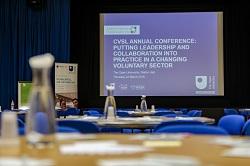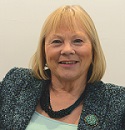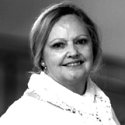Key issues facing leaders in the voluntary sector are highlighted

The value of leadership and collaboration, especially relating to the voluntary sector, were discussed in a time of profound change and varied challenges for this sector at a well-attended conference in Milton Keynes on Thursday 22 March.
Representatives from local, regional and national organisations attended the inaugural conference, Putting leadership and collaboration into practice in a changing voluntary sector, of the Centre for Voluntary Sector Leadership (CVSL). It is hoped this was the first of what will become an annual event for the Centre which was launched in October 2016.
Delegates heard from two respected leaders, Dr Ann Limb CBE and Pauline Broomhead CBE, as the keynote speakers. They were joined by academics from The Open University Business School, while there were also three interactive workshops, a panel discussion and the debut screening of an emotional and evocative short documentary film. ‘Juan’, the subject of An asylum seeker's story: Collective leadership in diverse communities, was present for the screening together with some of the documentary team and took questions from a captivated audience.
The Centre’s Director, Dr James Rees, described the CVSL as ‘sustainable’ and having a local, national and European reach, outlining some of its likely research outputs this year. He introduced a range of courses offered including local learning clubs for two courses on leadership in the voluntary sector (email for further details). Dr Owain Smolović-Jones also presented on the need for leadership development as opposed to just developing leaders, and that ‘leadership is a practice, not a person’.
Professor Siv Vangen, the Centre’s Founding Director and current Chair, had opened the conference and led one of the three afternoon workshops, along with Dr Rees and Visiting Fellow Dr Fidèle Mutwarasibo.
Milton Keynes-based Dr Ann Limb CBE, whose first leadership role was as principal of MK College and who acted as the catalyst for a decade of substantial growth, has been the first female Chair of the Scout Association for the last three years. She explained that one essential skill (sound judgement), two personal qualities (courage and humility) and a pinch of good luck contributed to her success as a leader.

“There have been a few recent examples, such as Mark Goldring (CEO, Oxfam Great Britain) and Facebook’s Mark Zuckerberg, where good judgement has been sadly lacking by leaders of an organisation. In Mark Goldring’s case, it was an example of a good response turning into a bad one as a positive interview on the Today radio programme was then ruined by later newspaper comments in The Guardian.
“You have to find the courage to make bold decisions and do the right thing for the organisation, as well as the courage to deal with failure, and to also have humility – it’s very hard not to get sucked into the power of the role; you do this at your peril. Be careful of your ego and the ego of others.
“And then, of course, sometimes you get lucky and sometimes you don’t! However, it’s important to always be in control of a situation and strong and effective leadership requires you to be authoritative, and not a shrinking violet.”
Dr Ann Limb CBE
Pauline Broomhead CBE has been the CEO of the Foundation for Social Improvement (FSI), which offers support to small charities and has 7,000 members, for the last decade.

“The view of leadership has changed over the years – you now have to lead through inspiration and example, and it has to be earned through actions, not just given. If you have the drive and passion to take action, you then have to take others with you along the journey.
“I co-founded the FSI and it offers great networking opportunities to show people that ‘they are not alone’, with the chance for leaders of small charities to come together and achieve change. Collaboration is important for mutual benefit and to share resources but there must be an equal commitment to make it work. I don’t think enough resources are being committed to collaboration, due to time and financial reasons.
“Small charities are the glue which hold society together and I’m passionate that they exist. The only difference between a small and larger charity is that you have no-one to fall back on; people demonstrate the same behaviours, they just lack the time.”
Pauline Broomhead CBE
Links
- Visit the CVSL resources page for links to videos from the conference and other resources from the Centre
- Visit the CVSL website for more information about the Centre
Upcoming Events
Student Hub Live: Preparing for, and producing your best EMA
Thursday, May 2, 2024 - 11:00 to 12:00
Online with Student Hub Live
Virtual Launch of the Black Leadership and Empowerment Programme (BLEP)
Thursday, May 2, 2024 - 11:00 to 12:30
Online
